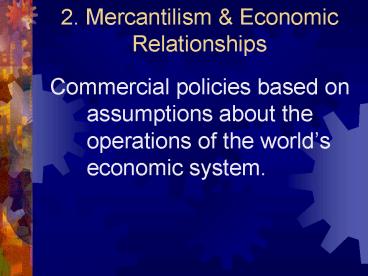2' Mercantilism
1 / 23
Title: 2' Mercantilism
1
2. Mercantilism Economic Relationships
- Commercial policies based on assumptions about
the operations of the worlds economic system.
2
Based on the Idea
- There was a finite amount of wealth in the world
the world was divided into national states
whose governments were competing for shares of
this wealth.
3
- What one nation lost, another nation gained.
4
Navigation Acts
- Why important?
- Only English or colonial merchants ships could
trade in the colonies.
5
- 2. Certain valuable American products could be
sold only in England or other English
colonieswool, sugar, tobacco, indigo, ginger
dyes, rice, naval stores, copper, furs
6
- 3. All foreign goods destined for sale in the
colonies had to be shipped to England first,
paying English import duties
7
- 4. Colonies could not export items that competed
with English products.
8
Political System in the American Colonies
- Governors
- King-figure to the colony
- Appointed by the King or colonial proprietors.
9
- Absolute veto power over legislature
- HOWEVER,
- the legislature could cut off his pay this was
used to convince the governor not to veto certain
bills.
10
- 4. Controlled expenditures once appropriation
bills were passed. - 5. Appointed officials.
- 6. Commander-in-chief of colonial militia or
royal troops
11
- 7. Head of established church (usually only the
Church of England) - 8. Governor cabinet were the court of last
resort in some colonies.
12
Administrator
- Sometimes lived in the colony after appointment.
- Role was to assent or veto legal proposals.
13
- Advisor to the Governor
- Part of the Council
14
Council (Upper House)
- Equivalent to the House of Lords
- Appointed
15
- Usually composed of wealthier colonists landed
aristocracy. - Advised governor on matters of policy.
- Court of last resort
16
Assembly (Lower House)
- Equivalent to the House of Commons
- Elected by landowning white males
17
- Represented middle class farmers merchants.
- Most colonies had religious requirements.
- i.e., House of Burgesses
18
Local
- Elected selectmen
- Appointed magistrates
- Town meetings
19
Judiciary
- Local justices of the peace, county courts,
appeals courts - Used common law (court-made law)
20
- Court interpretations were not made on common
sense. - Given original jurisdiction (geographic area)
21
- Crimes on high seas tried in Admiralty Courts.
- Treason was outside of the colonial courts
jurisdiction.
22
- The common law was greatly respected in England
23
- AND most British colonists brought this sense of
respect knowledge of English common law with
them to the American colonies.































